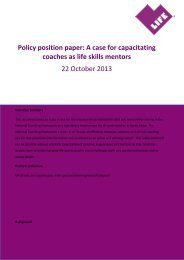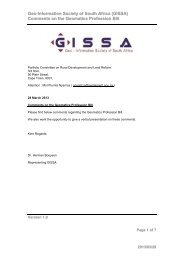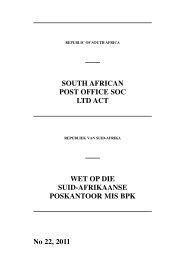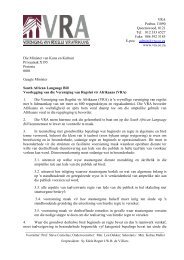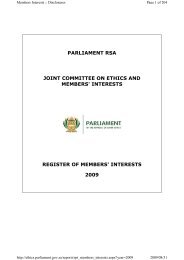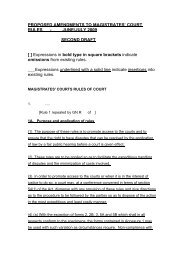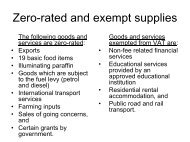An Easy Guide to Sex Work Law Reform - Parliamentary Monitoring ...
An Easy Guide to Sex Work Law Reform - Parliamentary Monitoring ...
An Easy Guide to Sex Work Law Reform - Parliamentary Monitoring ...
Create successful ePaper yourself
Turn your PDF publications into a flip-book with our unique Google optimized e-Paper software.
Prohibition of brothel-keeping<br />
Prohibition of living off/gaining from the earnings of sex workers<br />
Prohibition of receiving money in return for the provision of sexual services<br />
Examples of countries<br />
South Africa, Botswana<br />
1.2 The impact<br />
Impact on sex work - has the law fulfilled its purpose?<br />
Not much – the evidence is that the law has little effect on the number of sex workers or the number<br />
of clients, but a big effect on the behaviour of the police <strong>to</strong>wards sex workers and on the sustaining<br />
of stigma <strong>to</strong>wards sex workers.<br />
Impact of criminalisation on sex workers<br />
In South Africa, studies have documented substantial levels of direct violence against sex workers<br />
from clients, non-paying partners and the police (A) as well as structural violence against sex workers<br />
(B). The unequal power relations between sex workers and their sexual partners, heightened in a<br />
criminalised environment, limit sex workers’ ability <strong>to</strong> insist on the use of condoms during sex, thus<br />
increasing their risk of contracting HIV and other STIs (C). Discrimination, prejudices and sexual<br />
moralism of some health care workers create barriers for sex workers <strong>to</strong> access the health services<br />
that they are entitled <strong>to</strong> (D). If sex workers employ someone <strong>to</strong> act as security for them, <strong>to</strong> help<br />
increase their safety, that security person is labelled as a criminal by South African law 1 .<br />
SWEAT recorded approximately 360 reported human rights abuses of sex workers in 2011; however,<br />
based on the number of abuses reported <strong>to</strong> SWEAT, but not reported <strong>to</strong> Police, we believe that<br />
there are far more unreported cases.<br />
The dignity of women is denied in all these aspects. Criminalisation exposes sex workers, who are<br />
overwhelmingly women, <strong>to</strong> massive indignities through their interaction with police and other state<br />
agents, both in the work they do, and if they fall victim <strong>to</strong> crimes.<br />
Impact of criminalisation on sex worker-police relationship<br />
The fact that the work of sex workers is criminalised means that there is no incentive for the police<br />
<strong>to</strong> respect the human rights of sex workers unless they are receiving some financial, sexual or other<br />
benefit in return.<br />
Refer <strong>to</strong> SWEAT website – examples of police abuse of sex workers.<br />
1.3 Evaluation<br />
Criminalisation is necessary <strong>to</strong> prevent the furtherance of conduct abhorrent <strong>to</strong> the public good - the<br />
morals of some are imposed on the whole community, unleashing a new immorality of police abuse.<br />
1 “I Expect <strong>to</strong> be Abused and Have Fear: <strong>Sex</strong> <strong>Work</strong>ers’ Experiences of Human Rights Violations and Barriers <strong>to</strong><br />
Healthcare in Four African Countries” Fiona Scorgie et al, April 2011, African <strong>Sex</strong> <strong>Work</strong>er Alliance<br />
2



